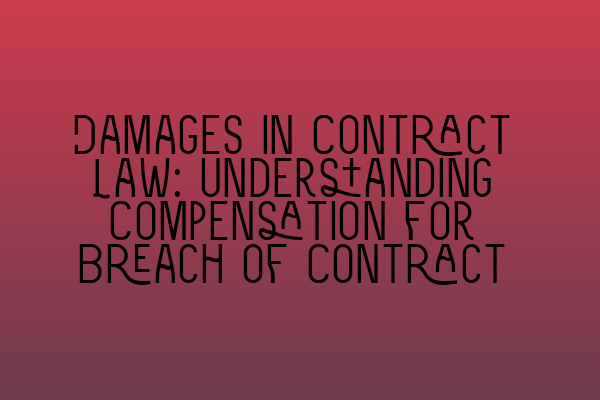Damages in Contract Law: Understanding Compensation for Breach of Contract
In the world of contract law, damages play a crucial role in compensating parties who have suffered a loss due to a breach of contract. Legal disputes arising from breaches of contractual obligations can be complex and stressful. It is important to understand the concept of damages and how they are calculated to ensure a fair and just outcome. In this article, we will delve into the intricacies of damages in contract law, explaining the different types of damages available and the factors considered in quantifying them.
Types of Damages in Contract Law
When a breach of contract occurs, the non-breaching party is typically entitled to receive damages to compensate for the loss suffered. There are two primary types of damages that may be awarded: compensatory damages and consequential damages.
Compensatory Damages: Compensatory damages are designed to put the non-breaching party in the position they would have been in had the breach not occurred. This type of damages aims to cover any losses directly resulting from the breach. It often includes the cost of repairing or replacing damaged property, lost profits, and any expenses incurred as a result of the breach.
Consequential Damages: Consequential damages are a form of indirect damages that arise from the unique circumstances of the non-breaching party. Unlike compensatory damages, consequential damages are not the immediate result of the breach itself but arise as a consequence of the breach. Examples of consequential damages may include lost business opportunities or reputation damage suffered as a result of the breach.
Factors Considered in Calculating Damages
When determining the amount of damages to be awarded, several factors come into play. These factors help the court assess the extent of the loss suffered by the non-breaching party. Here are some key considerations:
1. Foreseeability: Damages are generally only recoverable if they were reasonably foreseeable at the time the contract was entered into. This means that losses that were not reasonably anticipated or were too remote are usually not recoverable.
2. Mitigation: The non-breaching party has a duty to mitigate their losses by taking reasonable steps to minimize the damage resulting from the breach. If they fail to mitigate their losses, the court may reduce the damages awarded.
3. Causation: The non-breaching party must establish a causal link between the breach of contract and the loss suffered. They need to demonstrate that the breach directly caused the damages claimed.
4. Certainty: The damages claimed must be reasonably certain and not speculative. The non-breaching party must provide sufficient evidence to support the claimed losses, such as invoices, contracts, or expert opinions.
Seeking Legal Advice and Remedies
If you believe that you have suffered a loss as a result of a breach of contract, it is crucial to seek professional legal advice. A solicitor specializing in contract law can review your case and guide you through the legal process, helping you understand the available options and remedies. They can assess the strength of your claim and help you determine the appropriate course of action to maximize your chances of receiving fair compensation.
Remember that the remedies available for a breach of contract are not limited to financial compensation alone. In some cases, specific performance or an injunction may be sought to enforce the breaching party’s performance or prevent them from continuing their wrongful actions.
Conclusion
Damages in contract law are an essential aspect of ensuring fairness and compensating parties who have suffered a loss due to a breach of contract. By understanding the types of damages available and the factors courts consider in calculating damages, you can navigate the legal landscape more confidently and effectively. If you find yourself in a contract dispute, it is always advisable to seek professional legal advice to protect your rights and interests.
For additional resources on related topics, you may find the following articles helpful:
1. SQE 1 Practice Exam Questions
2. SQE 1 Practice Mocks FLK1 FLK2
3. SQE 2 Preparation Courses
4. SQE 1 Preparation Courses
5. SRA SQE Exam Dates
Remember, contract law is a complex area, and seeking guidance from qualified professionals is crucial to ensure the best possible outcome.
